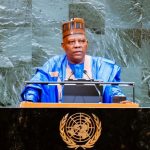President Bola Tinubu, on Wednesday, called for far-reaching reforms of the United Nations, insisting that the global body must adapt its policies to present-day realities or risk sliding into irrelevance.
Tinubu, represented by Vice President Kashim Shettima at the 80th Session of the UN General Assembly in New York, lamented the organisation’s diminishing influence as major global events increasingly unfold outside its corridors.
“The UN must embrace sweeping reforms to avoid growing irrelevance as world events increasingly bypass its influence,” he declared.
The President faulted the organisation’s record, citing the prolonged human suffering in the Middle East and other conflict zones as “stains on our collective humanity.”
According to him, the gulf between the UN’s lofty pronouncements and its actions has eroded its credibility in the eyes of the world.
“For all our careful diplomatic language, the slow pace of progress on these hardy perennials of the UN General Assembly debate has led some to look away from the multilateral model. Some years ago, I noticed a shift at this gathering: key events were beginning to take place outside this hall, and the most sought-after voices were no longer heads of state,” Tinubu said.
He also expressed disappointment at the lack of progress on critical global issues such as nuclear disarmament, Security Council reform, fair access to trade and finance, as well as the proliferation of small arms.
“When we speak of nuclear disarmament, the proliferation of small weapons, Security Council reform, fair access to trade and finance, and the conflicts and human suffering across the world, we must recognise the truth. These are stains on our collective humanity,” he stated.
Tinubu, however, positioned Nigeria’s economic transformation as a model for developing nations, while urging greater recognition of Africa’s role in shaping global stability.
He stressed that the continent’s vast mineral resources must no longer be exported raw but processed locally to ensure jobs, investment, and stability.
“Countries producing strategic minerals must benefit fairly from those minerals – in terms of investment, partnership, local processing and jobs. When we export raw materials, as we have been doing, tension, inequality, and instability festers,” he warned.





